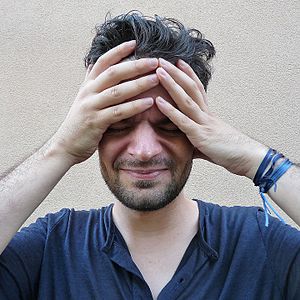Our website is made possible by displaying online advertisements to our visitors.
Please consider supporting us by disabling your ad blocker.
Occupational burnout
| Occupational burnout | |
|---|---|
| Other names | Burn-out, exhaustion disorder, neurasthenia |
 | |
| A person who is experiencing psychological stress | |
| Specialty | Psychology |
| Symptoms | Emotional exhaustion, depersonalization, reduced personal accomplishment,[1][2] fatigue[3] |
| Differential diagnosis | Major depressive disorder |
The ICD-11 of the World Health Organization (WHO) describes occupational burnout as an occupational phenomenon resulting from chronic workplace stress that has not been successfully managed, with symptoms characterized by "feelings of energy depletion or exhaustion; increased mental distance from one's job, or feelings of negativism or cynicism related to one's job; and reduced professional efficacy."[4] It is classified as an occupational phenomenon, but is not recognized by the WHO as a medical condition.[5] Maslach and colleagues made clear that burnout does not constitute "a single, one-dimensional phenomenon".[6]
National health bodies in some European countries do recognise it as such however,[7] and it is also independently recognised by some health practitioners.[8]
- ^ Cite error: The named reference
Maslachwas invoked but never defined (see the help page). - ^ Cite error: The named reference
Maslach2was invoked but never defined (see the help page). - ^ Cite error: The named reference
copenhagenburnwas invoked but never defined (see the help page). - ^ "Burn-out an "occupational phenomenon": International Classification of Diseases". www.who.int. Retrieved 2023-11-09.
- ^ Bianchi, R., & Schonfeld, I. S. (2023). Examining the evidence base for burnout. Bulletin of the World Health Organization, 101(11), 743-745. https://doi.org/10.2471/BLT.23.289996
- ^ Maslach C, Jackson SE, Leiter MP. Maslach Burnout Inventory Manual (4th ed.). Menlo Park: Mind Garden, 2016.
- ^ Cite error: The named reference
Lastovkova_2018was invoked but never defined (see the help page). - ^ Cite error: The named reference
van_Dam_2021was invoked but never defined (see the help page).
Previous Page Next Page


